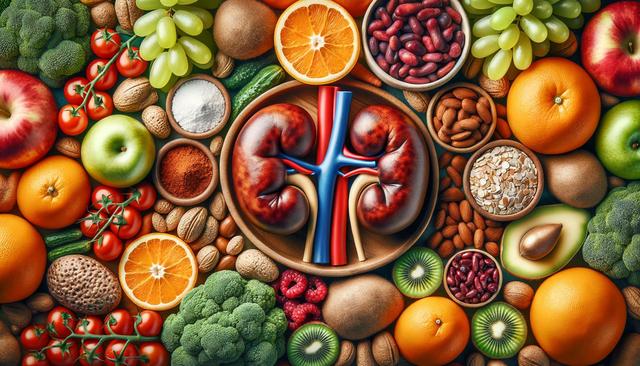Kidney-Friendly Foods That Help Reduce Stress on Your Renal System
Supporting kidney health through diet is one of the most effective ways to reduce stress on your renal system.

Understanding the Importance of Kidney Health
Your kidneys play a crucial role in maintaining your body’s internal balance by filtering waste, controlling blood pressure, and regulating electrolyte levels. When kidneys are under stress, either due to chronic conditions or poor dietary habits, their function can become impaired. Addressing kidney health through food is a preventative and supportive strategy. A kidney-conscious diet can help reduce the workload on these vital organs by minimizing waste production and maintaining proper hydration and electrolyte levels. By being mindful of what you eat, you can give your kidneys a break and support their long-term health.
Hydrating Foods for Kidney Support
Staying well-hydrated is essential for kidney function, but beyond water, certain foods with high water content can also contribute to hydration and reduce kidney stress. These foods help flush out toxins and prevent the formation of kidney stones by diluting minerals and waste in the urine. Some hydrating and kidney-friendly foods include:
- Cucumbers – low in potassium and high in water content
- Watermelon – contains antioxidants and hydrates effectively
- Lettuce – especially iceberg and romaine, which are high in water and low in sodium
- Bell peppers – provide hydration along with vitamin C
Incorporating these fruits and vegetables into daily meals not only aids hydration but also contributes to nutrient intake without overloading the kidneys with excess minerals or protein.
Low-Protein Options to Reduce Kidney Load
High protein intake can strain the kidneys, especially in individuals with compromised kidney function. Reducing protein consumption from animal sources and replacing them with plant-based options is often recommended. However, the goal is not to eliminate protein entirely but to consume it in moderation and from sources that are easier on the kidneys. Consider including:
- Quinoa – a complete protein with lower phosphorus levels than many meats
- Tofu – a plant-based protein that is less taxing on kidney filtration
- Egg whites – provide high-quality protein with minimal phosphorus
Balancing protein intake while ensuring adequate nutrition supports kidney function and helps manage conditions like chronic kidney disease (CKD) more effectively.
Managing Mineral Intake: Potassium and Phosphorus
Minerals like potassium and phosphorus are essential for health but can build up in the blood when kidney function declines. Controlling the intake of these minerals helps reduce the stress on kidneys. Low-potassium and low-phosphorus foods are key to a kidney-friendly diet. Examples of low-potassium foods include:
- Apples
- Blueberries
- Cauliflower
- Rice
For phosphorus, consider foods such as:
- White bread (in moderation)
- Unsweetened rice milk
- Fresh fruits and vegetables (instead of processed or packaged items)
Reading labels and choosing fresh ingredients over packaged ones can substantially lower phosphorus and potassium intake, easing the kidneys’ burden.
Foods That Naturally Support Kidney Function
Some foods contain natural compounds that support kidney health through anti-inflammatory or antioxidant properties. These foods may not only reduce the stress on kidneys but also promote overall wellness. Beneficial options include:
- Garlic – helps reduce inflammation and may support blood pressure regulation
- Cabbage – a cruciferous vegetable with antioxidants and low potassium
- Onions – add flavor without sodium and support detoxification
- Apples – provide fiber and antioxidant properties
Including such foods in your diet can offer a range of health benefits without adding strain to your kidneys. While dietary changes should be tailored to individual health needs, these options are generally recognized as supportive of kidney function.
Conclusion: Making Informed Dietary Choices for Kidney Health
Choosing foods that reduce stress on the kidneys is an important step for anyone concerned about their renal health, especially those with pre-existing conditions or a family history of kidney disease. Hydrating foods, moderate protein intake, and managing mineral levels are all practical ways to support kidney function. By focusing on fresh, nutrient-rich foods that are gentle on the kidneys, you can help maintain their essential filtering role and promote long-term health. Always consult a healthcare provider or registered dietitian before making significant dietary changes, especially if you have underlying health concerns.